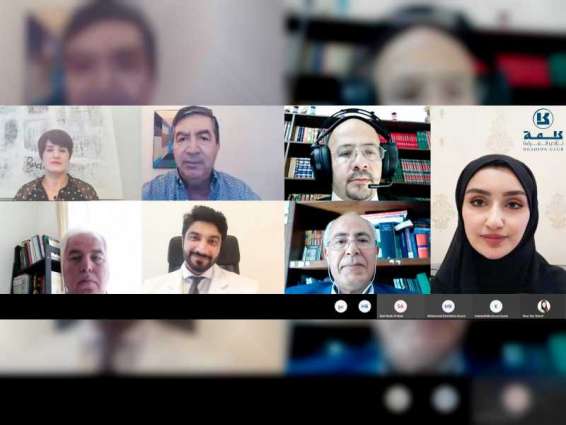ABU DHABI, (Pakistan Point News - 05th Oct, 2020) The Kalima Project for Translation has conducted a special virtual symposium yesterday entitled ‘The Role of Scientific Translation in Pandemics’, to celebrate International Translation Day, which falls on 30th September every year.
The session focussed on the role of translation in educating and informing readers about the coronavirus pandemic and other pandemics throughout history, and its importance in documenting the human experience with diseases and epidemics in different eras.
The symposium hosted several doctors and prominent translators whose work has influenced the Arab publishing world and contributed to increasing collective knowledge such as Dr. Zineb Benyaya, Muhammad Ziad Kebbeh, Izz al-Din Anaya, Hassan Ghozlan, Omar al-Ayoubi, and Dr. Khaled Al-Awadi, while media figure Maryam Fikry moderated the session.
During the workshop, several recently translated by Kalma were discussed, each work relating to disease and epidemics. Professor Muhammad Kebbeh began by talking about the Corona epidemic and its impact on the world, then moved on to talk about the book The Plague by Paul Slack, who documents people’s reactions to mass epidemics and describes their impact on humans in both economic and psychological terms. This approach enables the reader to note the startling similarities between pandemics of the past and the coronavirus pandemic in terms of its sudden appearance, speed of spread and the initial measures taken to tackle it.
Al-Ayoubi then addressed some of the positive effects of the coronavirus pandemic, which has put science and scientists back the fore and strengthened the status of scientific research. It has also served to promote the translation of scientific journals and publications, breaking down linguistic barriers and raising awareness of this dangerous illness, as well as methods of preventing contraction.
Speaking about the feasibility of translating books related to diseases and epidemics, due to their susceptibility to becoming outdated as a result of continuous scientific development, Al-Ayoubi said that the science books translated today enhance the methodology of scientific terminology and its development and provide the base for translation of developments in various branches of science.
Dr. Benyaya believed that translation is a cultural conduit and increases knowledge, making it essential when it comes to works detailing diseases and epidemics, especially considering these books retain their relevance as cultural and historical documents.
Benyaya used the works of Ibn Rushd and Ibn Sina as examples, as their writing served as the basis for modern medicine, although they have now been scientifically and medically surpassed.
Anaya, who participated in the session from Rome, said that Arabic translators face many challenges when dealing with scientific texts that revolve around health and medical issues in general. This requires a strengthening of the links between translators and scientific experts for texts to be more readily understandable to Arabic readers.
Dr. Al-Awadi, one of the UAE’s frontline professionals, stated that the Arabic library is poor when it comes to medical books and that many translated books need updating. He stressed the importance of translating texts relating to public health and specialist healthcare, even if the reader is well-versed in the language a book was originally written in, so they are easier for Arab readers to understand.
Hassan Ghozlan believed there has been a great deal of confusion and disinformation through the ages and, to counter this, it is necessary to establish a high level of awareness among the general public. Dr. Zineb Benyaya said that when comparing the precautionary measures in our crisis with those of the past, we see many similarities.
Regarding the possibility of publishing literary and creative works related to the recent pandemic in the future, Dr. Zainab said that just as post-war literature is abundant, there may be something called post-pandemic literature. Izz al-Din Anaya believed that, while the coronavirus pandemic has negatively impacted publishing and translation, it has boosted the creation and translation of books about fighting epidemics and promoting public health.
Al-Ayoubi believes that the narratives related to epidemics and disasters demonstrate the ability of humans to be creative in documenting history, making it easier for readers and students to comprehend literature that details responses to specific events, incidents, disturbances and revolutions.
In conclusion the speakers said that scientific translation is an important tool to spread knowledge and meet the needs of scientific research, but that it is very rare in the Arab world as it does not keep pace with the rapid knowledge increase. This has led to failure in developing the medical and scientific terminology used in the Arabic language, however, the solution lies in the translation of more scientific books across multiple disciplines.




